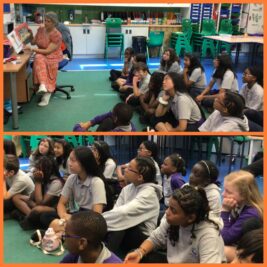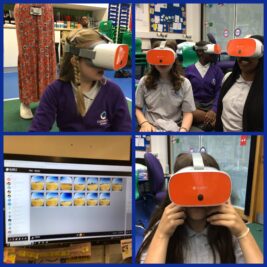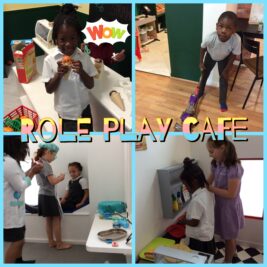Who is IQM?
IQM is the only national inclusion award in the UK. For over 20 years and in over 20 countries, schools, MATs and Local Authorities use the Inclusion Quality Mark to recognise exemplary inclusive practice.
Get in touch for your FREE school information pack today.
Tidemill Academy Achieves Flagship Status
August 14, 2023
Tidemill Academy has achieved the Inclusive School Award with Flagship status.

Curriculum that Reflects Diversity
Our Assessor started the visit by meeting with the Headteacher and SENCo/Inclusion Co–ordinator, who gave an overview of Tidemill Academy to set it in context.
The Headteacher has been at the school since January 2022 and the school is part of the REAch2 Multi-Academy Trust. The Academy is a two-form entry mainstream primary school with a nursery. There is also a Speech and Language Resource Base which serves children from across Lewisham with a Developmental Language Disorder (DLD) as a primary need. With the inclusion of the nursery, they have the capacity for approximately 480 children. The school has a waiting list of children hoping to get a place at the school and there is very high mobility in and out of the school. This can cause issues but the school is proactive in ensuring these children are carefully inducted and included. However, there are many families in temporary accommodation and are often moved elsewhere when they are given more permanent housing. There has been an explosion of new flats being built around the school and the number of children needing school places does not appear to be diminishing, unlike in many other inner-city London Boroughs.

The school is in an area of deprivation and there is a 45% Pupil Premium (PP) but many others hover near that low-income baseline. The school runs a Food Bank from the school and that also provides pre-loved uniform items. The amazing Family Support Worker our Assessor met runs it because there are so many vulnerable families. The school population is diverse and reflects the local area. Subsequently, they have developed a curriculum that reflects this diversity.
Unique Culture and Ethos
The REAch2 Academy Trust has 60 primary schools and Tidemill Academy is part of a small cluster. The school is able to design its own curriculum and pedagogy and develop its own unique culture and ethos. However, it does have some common policies such as the Safeguarding Policy. The Trust is a supportive Trust and the Headteacher is part of a good supportive Headteacher group.
The Academy is the lead school in initial teacher training for REAch2 and has a carefully planned professional development programme for staff. This ensures pupils are supported by a team of talented and dedicated staff at all levels who have a positive impact on pupil achievement and wellbeing.
The school hosts and runs a resource base, funded by the LA for 16 children. There is someone at the LA who oversees the resource bases in the Borough, and she is supportive and helpful. Only children with an Education, Health and Care Plan (EHCP) can be allocated a place in the resource base. One of the school’s Phase Leaders is in charge of the unit and the SENCo oversees it. Currently, there are ten children in the base and they make sure every child’s individual needs are catered for.
The school is fully staffed for September, but it is difficult to recruit TAs, and are having to use Agency Staff. Currently, there are about 12 Learning Support Assistants (LSAs) and there is a TA in every class. A few are on long-term sick, so the school is unable to replace them.
Reputation for Excellent Provision
The school has a reputation for excellent provision for meeting the needs of children with SEN. Subsequently, the number of pupils admitted to the school is now over 25% of the cohort. The SENCo and Headteacher receive a large number of consultations from the LA looking for places in the school for children with a huge range of needs. Currently, there are 23 children with EHCPs, and the school receives funding for a number of others whose plans are not finalised yet. Meeting the needs of such a large group of children with additional needs is a huge job and funding is always an issue. The school is part of the SEN Forum, and it is well known that the Borough has overspent its SEND budget, so there is no expectation that funding will improve.

Children presenting with Social, Emotional and Mental Health (SEMH) needs are increasing in the Borough and in the school and there is some specialist provision – a pathway offer for SEMH but places are limited. Furthermore, children who are successfully able to access this provision are expected to return to mainstream after a period of time and dual placements seek to make this happen. However, the numbers returning to mainstream are not very high.
There is a CAMHS service in Lewisham and the school has a named Educational Psychologist (EP) but does not have a sufficient number of days from this service. All the services are under extreme pressure in terms of funding and staffing.
Attendance
The next meeting was with one of the Deputy Headteachers who is also the Lead DSL, along with the Family Liaison Officer to talk about safeguarding procedures and attendance. Our Assessor was told that attendance is a major issue, particularly persistent absence (PA), but overall is still above national at 95%. They have not yet returned to pre-pandemic attendance levels. Persistent absence is now 12% but was 17%. Actions taken by the school brought the rates down and these are still in place.
There are plans to start a Family Hub to support particularly vulnerable families. The school already runs parent workshops to support these families but there is always more to do. There are no school refusers as children want to come to school because it is a safe space and there is a really engaging curriculum. However, poor attendance is linked to the mental health of parents. The Family Liaison Officer explained many parents/carers are not very confident. Many have poor literacy skills and she helps them sort out official letters and supports them with phone calls to officials such as housing, the GP and police, and so on. She meets the children from vulnerable families weekly. She signposts families to various parenting courses but families do not always take these up.
The Deputy Headteacher explained that there is a school safeguarding team that he leads. The FLO is the Deputy DSL and the SENCo and they are now training another Deputy Headteacher to join the team along with another member of staff. They use My Concern to record concerns and actions taken to safeguard pupils. Previously the system was paper-based, and it takes time to transfer everything to My Concern and to train staff to report on to the system. The safeguarding team meets weekly to discuss individual pupils. Staff are good at noticing and reporting concerns, and they always make sure they give them feedback about what they have done. Our Assessor was told staff really care about the children.
Some of the biggest safeguarding issues include mental health, alcohol, drug abuse and Domestic Violence. Peer-on-peer abuse is also a growing issue. There is a problem with cross Borough children as Social Care Departments use different systems for recording so the school cannot always access the information easily.

The DSLs receive supervision from the LA but funding for this has just been pulled. This supervision was provided by a senior social worker who supported them with difficult cases. The DSLs also went on training around ‘signs of safety’ and hearing pupils’ voices. This supervision also supported the DSLs with their own mental health and feelings. This was useful but will no longer be available. There is some supervision from the Trust but it is a different format. They provide safeguarding audits and DSLs are able to go through key chronologies with them.
Clear and Detailed Scheme of Work
The next meeting was with the PHSE Co-ordinator who explained the school put the curriculum together. They set up their own working party to ensure that it contained all the statutory content as well as relevant content for their children. There is a clear and detailed Scheme of Work. It is a spiral curriculum and the PHSE Lead has the overview of what is happening and when.
Much of the PHSE curriculum is linked to mental health and wellbeing, safeguarding and peer-on-peer abuse. There is a whole term linked to these issues where mental health and wellbeing is explicitly taught. These topics and others are revisited throughout the spiral curriculum.
Our Assessor was told the Schemes of Learning give teachers confidence in teaching PHSE and they are fully resourced. Sex and Relationship Education (SRE) topics are also included in the schemes. They introduce staff and then pupils to new vocabulary. Summer (term 2) is when sex and relationships are taught. They send out letters to parents to inform them about what they will be teaching and share resources that will be used. They split the girls and boys in Year 5 and the children enjoy the lessons. They are good at talking about emotions and feelings and the school now feels more empathetic. Pupils and staff now have the vocabulary to talk about such things.

The school is reviewing the behaviour policy and is working with the LA (who funds the resource base) to reflect on how appropriate the policy is with the high level of SEN in the school. They have been looking at the research into this area and this shows them that they need to find a new way to manage good behaviour. There are a number of girls now presenting with Autism Spectrum Disorder (ASD) but have been masking it for a long time. As a change of approach, the school has been considering the language they use with children. They have stopped any public shaming and terms such as ‘sunny and cloudy’ behaviour days. They want to be more trauma-informed. They have all read the book, ‘When the adult changes, everything changes’ (Paul Dix) and will be looking to see how and if they can adopt the trauma-informed approach throughout the school.
There is no assessment scheme for PHSE; instead they are using ‘Big Books’ to record what they have been doing in their lessons and they use a process called, ‘a thought catcher’ where children can write down their thoughts and feelings. There are lessons about consent and about friends and having healthy relationships.
When describing pupil behaviour, they urge staff and pupils to use the Zones of Regulation to try to understand who they are and what is behind the behaviour.
The Deputy Headteacher explained that staff wellbeing and mental health is the school’s biggest challenge, and the appraisal and performance management systems try to address these issues with teachers and support staff.
Atmosphere was Calm and Friendly
Following these discussions, our Assessor had the pleasure of going on a tour of the school with three pupil advocates. They were all Year 6 pupils and they led expertly around the school. They were able to explain what was happening in every part of the school including the nursery, reception and the resource base. Our Assessor was aware that they should have been rehearsing with their Year 6 classmates for the Year 6 production. They went to see how this was going during the tour. The new building is well-planned, light and airy. The playgrounds are small but are incredibly well-planned and used. The displays indicate the inclusive nature of the school as well as the diversity of the population.
Behaviour around the school was very good and the atmosphere was calm and friendly. Children were obviously engaged and enjoying lessons and playtime.
A parent had been invited in by the FLO to meet and to share her story and the way the school had supported her. Our Assessor was introduced and the FLO explained why and what she was doing in the school. Our Assessor checked to see if the parent was happy for her to be at the meeting and to share her experience. The parent was happy to do so as the school had been so supportive to her and her child and she believes she would not still be here if they had not helped her. She became very tearful during the meeting, but she said they were “happy tears”.
Her child has responsibilities within the school, is doing well academically and is currently receiving counselling to help her gain confidence as a result of the trauma she had suffered from seeing her mother experience DV.

A chronology of support, which started in November 2017, was discussed. This included, for example, Place to Be and Place to Talk, Early Help, Team Around the Family (TAF). The FLO does a weekly drop-in to see the child in school who knows that the FLO is always available to speak to, if required.
The FLO told us that the child did not want to come to school because the child was worried about her mother so was allowed to phone mum from the office during the school day. The school made a referral to Young Carers. The child also participated in Art Therapy, is still on a Children in Need (CiN) plan and has a new social worker now. The child also has sessions with a behaviour mentor and has been part of several Circles of Friends’ sessions.
In addition, the FLO has supported the mother with different forms of communication with a range of external organisations. She has also been referred for Cognitive Behavioural Therapy (CBT) therapy and she is now on the waiting list.
The child no longer has nor needs one-to-one support but always has someone to go to if she needs support at any time. The best news is that the school applied for the child to have a free holiday with ‘Free To Be Kids’ for five days in August and is really looking forward to it. Originally, the child was reticent about going and being away from mum until the child went to the school residential and, as a result, has not looked back since!
This was just one case study of the way the school supports vulnerable children and families. The thought, care and consideration for every aspect of the child’s learning along with their wellbeing and mental health is extraordinary and is to be congratulated.
Playgrounds
The next meeting was with a number of Pupil Playground Leaders and the OPAL Leader. The TA, who is the leader of this group of children and who has responsibility for planning and leading OPAL activities, is very passionate about her role. She explained that they have identified 16 types of play and they try to have them all available for children in the playgrounds. The 16 types of play are based on the model of an Early Years Foundation Stage (EYFS) playground where the outdoor space is an integral part of the learning environment.
The school has had to restructure its playgrounds to make these available. To do this, the school has had to invest heavily in developing the playgrounds. An OPAL playground means providing a different range of materials, for example, a couch and dress-up stage, both in full use during my visit.
Our Assessor was told that the rationale for this development is that play takes up 20% of the time in school and they want this time to be high quality and add to learning. Play should be led by the child and the play should extend the learning opportunities.
Pupil voice has an integral part of the OPAL developments and staff sat together with eight children to list the reasons as to why the playground was so important. They were and are happy to share their views and opinions. OPAL is fully embedded in assemblies and when a new element is introduced into the playground, they introduce it and explain to the children how to use the new resources safely. There are strict safety rules because it is important for children to have the opportunity to take risks. The Playground Leaders usually run these assemblies and they are on duty every day to ensure that equipment is used safely.
The Headteacher has had a petition from the School Council about football clubs and allowing balls in the playground so this will need to be discussed.
The Playground Leaders wear hi-vis jackets when they are on duty so they can be easily identified. Our Assessor saw them at work playing with younger children and others who looked a bit lost or lonely. They take their role very seriously but obviously enjoy actually using and playing with the equipment themselves.
Thinking and Talking

Next our Assessor then sat in for part of a Mental Health and Wellbeing session with a group of six pupils. The group was facilitated by a worker from the Lewisham Mental Health Support Team (MHST). She started the session by reminding the pupils of the aims of the session and did a check before they moved on (it had been a while since their last session). There was stimulus to get them thinking and talking about how they feel about school.
Following the session with pupils, our Assessor had a brief session with the MHST facilitator who explained the way the MHST team offers support to children and school before they need to go to Child and Adolescent Mental Health Service (CAHMS). It is a preventative service trying to intervene before the situation becomes bad enough for a referral to CAHMS. That service is difficult to access even when the child’s needs are fairly extreme. This service is trying to fill in the gaps in provision and they work with families where they can. The service is welcomed by the school and there is no shortage of pupils who can benefit from the service.
Next, our Assessor met with four of the Pupil Mindfulness Leaders. They explained how they had applied for the job. It was only for pupils in Year 3 and upwards. They said that was the way they had to apply for all leadership roles in the school. The group did a presentation about their roles and how mindfulness exercises help children to calm down. The group started with some breathing exercises and got us all to join in then they explained why mindfulness is so important and so beneficial for dealing with anxiety and wellbeing.
The group spoke about some of the actions the school has put in place to practice mindfulness in school. They now have Mindfulness Minutes on Wednesdays. This is done over the tannoy and they lead the children through different exercises. There are also regular Mindfulness Assemblies. These are important in teaching children different mindfulness techniques. The group also said that they socialise with different year groups so they can tell them where to get help if they need it. They showed examples of artwork done by the Art Leaders showing what mindfulness represents.
Full and Detailed Action Plan
The last session of the day was with one of the Deputy Headteachers who will lead the new Flagship Project on Adaptive Teaching. A full and detailed action plan was provided.
The school’s journey towards adaptive teaching was and is a huge pedagogical journey with many bumps in the road. Our Assessor was told staff understood what it is all about and have been looking at the research. They understand that teacher expectations affect outcomes and that is why it is necessary to set high expectations for all.
Scaffolding is provided at all stages for all pupils but sometimes they may need to remove the scaffolding to let pupils be more independent and allow them to make mistakes. Therefore, teachers need to understand when and how to provide appropriate scaffolding. Teachers are encouraged to identify barriers to learning in a forensic way.
The plans were discussed in more detail and the link between the curriculum developments and pedagogy. The aim is about making every primary lesson work.

The school has run training sessions with Teaching Assistants and Learning Support Assistants and teachers on how to make effective use of an additional adult in the classroom. Our Assessor was told they still have a lot of work still to do. However, because they have such a well-planned curriculum, they should not have to worry too much. They are taking small steps in training on and implementing scaffolding. The SENCo has done some training on Five A Day Principles and provided lots of examples. It is about providing high-quality teaching that benefits pupils with SEND as well as other pupils. The school has bought a programme called CLICKER to add to the toolbox teachers can use.
The school has put a lot of thought and effort into planning their new IQM Flagship project and they have already started implementing their plans. They have evaluated the current project very carefully and have made great progress with their inclusion agenda.
Our Assessor added, “Tidemill Academy takes inclusion very seriously indeed and they have pushed forward with their agenda despite some of the difficulties. They are a school that collaborates with others and makes the best use of all their resources. The Headteacher and her team are totally committed to inclusion and they are doing everything in their power to make this a reality. They continue to meet the IQM Flagship criteria and deserve congratulations for all that they have done and continue to do. They have much to be proud of. “
Find out more about the IQM Inclusive School Award
If your school is interested in obtaining the IQM Inclusive School Award or you wish to talk to a member of the IQM team please telephone:
028 7127 7857 (9.00 am to 5.00 pm)
or email: admin@iqmaward.com for further details.
Want more information on the IQM Award? Click here to request your free IQM information pack
Other Posts

About IQM
The only national award for inclusion in the UK, IQM has been committed to recognising exemplary inclusive schools for over 20 years and in over 20 countries around the world. The three awards allow schools and organisations to dcelebrate their inclusive practice against nationally recognised framework.
Site Links
© 2025 Inclusion Quality Mark | website developed & cared for by digidoda


